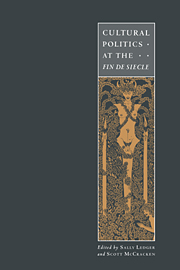Book contents
- Frontmatter
- Contents
- List of illustrations
- Notes on contributors
- Acknowledgements
- Introduction
- 1 The flight to the real
- 2 The New Woman and the crisis of Victorianism
- 3 Empire, ‘race’ and feminism at the fin de siècle: the work of George Egerton and Olive Schreiner
- 4 W. B. Yeats and Irish cultural politics in the 1890s
- 5 The double lives of man: narration and identification in late nineteenth-century representations of ec-centric masculinities
- 6 Henry James and the spectacle of loss: psychoanalytic metaphysics
- 7 ‘A very curious construction’: masculinity and the poetry of A. E. Housman and Oscar Wilde
- 8 The Pilgrims of Hope: William Morris and the dialectic of romanticism
- 9 Urban utopias: socialism, religion and the city, 1880 to 1900
- 10 Vampires and the empire: fears and fictions of the 1890s
- 11 Utopia, Limited: nationalism, empire and parody in the comic operas of Gilbert and Sullivan
- 12 Technologies of monstrosity: Bram Stoker's Dracula
- 13 Postmodernism, a Chance to reread?
- 14 Is market society the fin of history?
- Select bibliography
- Index
7 - ‘A very curious construction’: masculinity and the poetry of A. E. Housman and Oscar Wilde
Published online by Cambridge University Press: 29 September 2009
- Frontmatter
- Contents
- List of illustrations
- Notes on contributors
- Acknowledgements
- Introduction
- 1 The flight to the real
- 2 The New Woman and the crisis of Victorianism
- 3 Empire, ‘race’ and feminism at the fin de siècle: the work of George Egerton and Olive Schreiner
- 4 W. B. Yeats and Irish cultural politics in the 1890s
- 5 The double lives of man: narration and identification in late nineteenth-century representations of ec-centric masculinities
- 6 Henry James and the spectacle of loss: psychoanalytic metaphysics
- 7 ‘A very curious construction’: masculinity and the poetry of A. E. Housman and Oscar Wilde
- 8 The Pilgrims of Hope: William Morris and the dialectic of romanticism
- 9 Urban utopias: socialism, religion and the city, 1880 to 1900
- 10 Vampires and the empire: fears and fictions of the 1890s
- 11 Utopia, Limited: nationalism, empire and parody in the comic operas of Gilbert and Sullivan
- 12 Technologies of monstrosity: Bram Stoker's Dracula
- 13 Postmodernism, a Chance to reread?
- 14 Is market society the fin of history?
- Select bibliography
- Index
Summary
In its widest possible sense… a man's Self is the sum-total of what he can call his; not only his body and his psychic powers, but his clothes and his house, his wife and his children, his ancestors and friends, his reputation and works, his lands and horses, and yacht and bank account.
(William James, Principles of Psychology, 1890)Do you know why poetry and philosophy are nothing but dead letter these days? It is because they have severed themselves from life. In Greece, ideas went hand in hand with life; so that the artist's life was already a poetic realization, the philosopher's life a putting into action of his philosophy; in this way, both philosophy and poetry took part in life, instead of remaining unacquainted with each other, philosophy provided food for poetry – and the result was admirably persuasive. Nowadays, beauty no longer acts; action no longer desires to be beautiful; and wisdom works in a sphere apart.
(André Gide, The Immoralist, 1902)This chapter is concerned with cultural boundaries and their enforcement as binary oppositions in the lives and work of two fin-de-siècle poets. It takes masculinity as its focus, because masculinity's dominant ideological position means that the boundaries which define it are most in need of policing. At the end of the nineteenth century masculinity had become an unstable entity.
- Type
- Chapter
- Information
- Cultural Politics at the Fin de Siècle , pp. 137 - 159Publisher: Cambridge University PressPrint publication year: 1995
- 6
- Cited by



